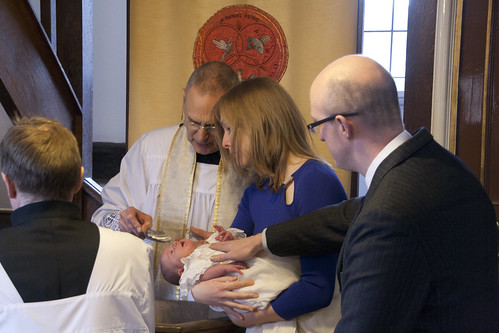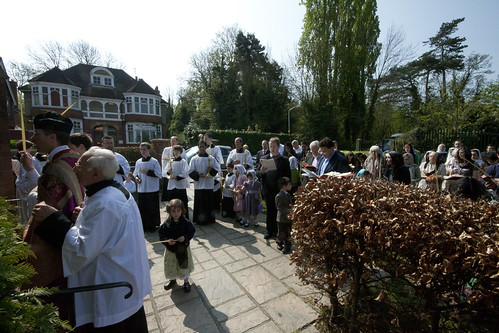 |
| A symbolic washing, but an efficacious sacramental cleansing. |
Here's another sorry rant from Mgr Basil Loftus. The Catholic Times, 28th July.
One of the more incomprehensible rulings from the Congregation for Divine Worship was that the practice is consecrating a single vessel of wine, and then dividing it between several chalices before Communion, was forbidden. why? Because the single vessel - usually a jug - was not a 'chalice' within the meaning of the rubric. This action of distributing the Precious Blood from a single vessel into several, perfectly symbolised the sharing from 'the one cup', but tough - 'no, you can't', unless of course you feel that Holy Father Francis's 'liturgical emancipation' covers this regulation as well.
And symbolism is of no real use if it is less than generous. A dab with an oily rag does not symbolise the healing power of Christ in the way that liberally poured oil during the Sacrament of the Sick does. A dribble of water from a mother-of-pearl shell does not symbolise baptismal cleansing from original sin in the way that dunking the baby in a bath of water does.
...
If through over-emphasis on the numinous, or Godly, we try through the liturgy to create Heaven on earth, we compromise our theological understanding of both. Life in Heaven is our goal; earthly life is the means to it. Christ's ordained [sic] that his Mystical Body on earth, his Church, should be sustained, grow, and be propagated thorough the earthly act of marital sexual intercourse. ...
Commenting regularly on Loftus' output gives me the chance to address many of the classical positions of liturgical progressives. Here we are with what Fr Tim Finigan said was once called the critique of 'thimble symbols'. As Fr Tim points out, there is a tension within the progressive mindset between wanting to use loads of water and oil and bread and other symbols in the liturgy, and also wanting everything to be stripped down, simplified, minimised and so on.
 |
| A symbolic sprinkling of a symbolic (empty) coffin, but a genuine blessing for the deceased. |
Similarly with the water used in baptism. We have a symbolism of washing: true. Literal washing washes away dirt. Baptism removes Original Sin. We know something more than a baby having a bath is going on precisely because we are not dipping the baby in a bath: precisely because we are using a small amount of water from a silver shell (I've never seen a 'mother of pearl shell' used in baptism).
Loftus seems to be making the mistake of St Peter at the Last Supper. 'Not my feet only!' he says: wash all of me! But Our Lord didn't need to take the disciples down to the bathhouse and douse them with soapsuds to make His point: a symbolic washing, a symbolic act of service, was sufficient.
 |
| A symbolic procession with palms. We aren't literally entering Jerusalem. |
Talking of bathrooms, the pouring of the Precious Blood from one container into another is a bit too much like a toddler playing with bath toys for my taste. Loftus takes exception to the liturgical law on this point, but is apparently afraid of the reason for it, so he ignores it. This is what Redemptionis Sacramentum says:
[106.] However, the pouring of the Blood of Christ after the consecration from one vessel to another is completely to be avoided, lest anything should happen that would be to the detriment of so great a mystery. Never to be used for containing the Blood of the Lord are flagons, bowls, or other vessels that are not fully in accord with the established norms.
It is pretty obvious that, although the 'norms' on vessels for the Precious Blood are one consideration, it is not the main one. What do they mean, 'lest anything should happen that would be to the detriment' of the Precious Blood? I don't think this is a difficult question: they are talking about the risk of spilling it.
The problematic consequences of the routine distribution of the Precious Blood to the Faithful to large congregations simply go on and on. Great swathes of Redemptionis Sacramentum is taken up with them. But that is a topic for another day.
 |
| The Ashes are a sign of penance more practicable, but no less efficacious, than sitting in sackcloth and ashes. |
One suspects, "not wanting the liturgy to be too reminiscent of the supernatural," is because the real problem is a difficulty with anything speaking of the supernatural.
ReplyDeleteFr Loftus is a heretic.Pray for his soul.
ReplyDelete